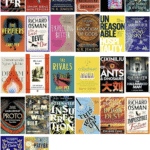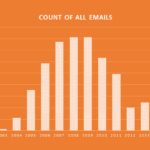Ooh, I love lectures at the moment. Many historians aren’t so fond of attending, and though I tend to side with Matt’s “well, we are paying for it” line I think I also just enjoy the format. (Part of me will always see it as a luxurious indulgence just to be able to sit back and not have to contribute anything, unlike school.) But yes, today we had some rather cool stuff on natural law, and it’s great to have someone kindly walk you through from Aristotle to Hobbes. And it also reminds me of the rather useful chameleon-like ability of History to take on many other subjects: why, to take an entirely hypothetical example, would anyone ever want to run away and do – ooh, I don’t know – A-Level Philosophy, say, when they could stay in a rather more comprehensive educational experience? ![]()
And talking of Philosophy, I must take advantage of the ever-present incestuousness (not my phrase) of blogs and have a barely disguised rant against the very idea of an ‘opposition’ between Arts \ Humanities and Science. Yeah yeah, I know CP Snow got there first, but at times I even find it rather difficult to understand how on earth anyone could believe in such a thing.
For two things to oppose each other, they must first be playing the same game, yes? A tennis player can oppose another tennis player over a game of tennis, but a tennis player cannot meaningfully ‘oppose’ a basketball player since each are playing under rather different rules. You can oppose someone who says that killing is right by arguing that killing is wrong, but not by arguing that killing is great fun. (For the people who will inevitably read this and smirk knowingly at how ‘black and white’ these examples are, they might want to consider what a beautiful example of opposition they are setting up between ‘black and white’ and ‘shades of grey’.)
Science is the method (the method, dammit, not the body of knowledge) by which we seek to understand the physical world. The Arts is demonstrably not, even though it might sound a bit like it, since the ‘physical world’ of Science is the world which would exist without us anyway. (Obviously, something like ‘the human brain’ wouldn’t exist without us, but the underlying concepts behind how that one specific organ operates would.) Artistic works are – to state the blindingly obvious – subjective. It is us – or other conscious minds – who think of something as being beautiful or terrifying or profound. Sure, a poet who talked about the beautiful night sky and then insisted that this was an objective truth about the sky would be setting themselves up in opposition to Science, but they would also be setting themselves up in opposition to another poet who thought of the dark and gloomy night sky as a harbinger of doom.
OK, so they’re not in opposition to each other in what they actually say. But perhaps one is ‘more important’ than the other, and so the opposition is actually between which you consider more important. But importance is subjective – importance doesn’t exist without us. So you have to ask… important for what? And why are we bothering to even come to an answer, when we know very well that we don’t – and couldn’t – choose between them?
Proclaiming that you can somehow compare the relative merits of Arts and Science is to make a nonsense of language, which is precisely the thing that the “read some poetry!” brigade (and they’re right, it’s good stuff) claim to value so much. It’s equivalent to accosting someone on the street and shouting “Oi! You claim to be a good person, but here you are walking down the street, an action which is nothing to do with right and wrong!”. Or berating this blog post for being a really terrible skipping rope.
(Advertisement – hey! Are you an Arts undergraduate feeling a little bit needy for some Science? Then ask a medic over dinner how antiretrovirals work! I did, and I got a beginner’s course in RNA absolutely free.)
P.S. Aha, so you’ve noticed that by this logic religion – or more specifically, theology – can’t be said to be ‘in opposition’ to Science, since it isn’t a method by which we seek to understand the physical world? The problem is that theology actually makes a great deal of claims about the physical world, and therefore – sorry – most definitely is. Unless your theology is entirely and absolutely metaphysical, which seems to hinge on the admission that its existence would make absolutely no difference one way or the other to the physical world at all. “We’re all dreaming in a world and there could never be any evidence of the ‘real’ world.” “God exists and must be known by faith alone, but takes no interest and has no effect at all on the universe.” Well, fantastic – now start choosing (how, again?) between the infinite varieties of such untestable beliefs.)








I don’t agree that the very idea of opposition is wrong.
they are more ways they oppose then just those you’ve mentioned.
For example, the Arts and Sciences play the same (zero sum) game, competing for students to study them.
It seems to me that Arts (History at least) is winning here, my brother had been looking for a job in the summer, came back almost every day without success saying "Its no good, every else also has a history degree"
Also in my own school, the Sciences and Maths A-Levels have much less students then English and History.
Oh absolutely, and hence I said they’re not in opposition ‘in what they actually say’.
Yes, you absolutely can put into opposition the act of students *learning* about Arts or Sciences. The comparison works because you can compare things like ‘number of students’ in each case. But that’s not the same thing as saying that the ideas they form can be opposed as intellectual expressions in themselves: you can’t make the same kind of comparison because you can’t put ’emotion conveyed by poem’ up against ‘accuracy of hypothesis’ in any meaningful way.
"…barely disguised rant against the very idea of an ‘opposition’ between Arts \ Humanities and Science. Yeah yeah, I know CP Snow got there first, but at times I even find it rather difficult to understand how on earth anyone could believe in such a thing…"
^^ makes it sound like you’re dismissing all kinds of opposition between the two.
I read it! I am studious and deserve much praise
Tbf though my eyes hurt now. Can you publish your blogs in a weekly magazine?
xxxxx
I read it too, which is unusual nowerdays because I usually don’t understand the long ones
I agree with Lucy, I’d prefer a different format. Maybe in the form of a podcast, with you reading to me with some ambient whalesong in the background?xx
Oops, I used two derivatives of the word ‘Usual’ in one sentance. This looks wrong… Is this wrong?xx
Ambient whalesong is officially the way forward! I vote for this.
xxxxx
But why is all the rum gone?
Oh and I must just say! There’s nothing wrong with A Level Philosophy! I was going to do it